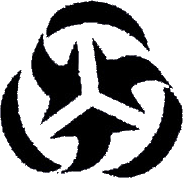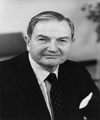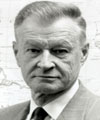 This is a public offshoot of the CFR but with two important distinctions: first, it brought the Japanese ruling elite into the inner circle of global power brokers. Second, it is the brainchild of David Rockefeller. Its website states its public aims:
This is a public offshoot of the CFR but with two important distinctions: first, it brought the Japanese ruling elite into the inner circle of global power brokers. Second, it is the brainchild of David Rockefeller. Its website states its public aims:
The Trilateral Commission was former in 1973 by private citizens in Europe, Japan and North America to help think through the common challenges and leadership responsibilities of these democratic industrialized areas of the wider world.
It fails to mention that most of these private citizens are the richest and most influential individuals on the planet, and that all of the 350 members have been hand-picked by David Rockefeller. Neither does it explain that it was given the stamp of approval at a secret Bilderberg meeting in April 1972 in the tiny Belgian town of Knokke-Heist.
The website also states, “originally established for three years, our work has been renewed for successive triennia (3-year periods), most recently for a triennium to be completed in 2006.” This cleverly gives the impression that its tenure is limited and thus reduces the significance of its extensive and continuing stranglehold on domestic and foreign policy.
Many members of David Rockefeller’s newest international cabal (With No Apologies, by Senator Barry Goldwater) are also Bildeberger and/or CFR members. They have headquarters in New York, Paris and Tokyo, and they meet once a year in one of these regions. Their house publication is called Trialogue, and it publishes Triangle Papers that are in the public domain.

 Rockefeller was heavily influenced by the research of Zbigniew Brzezinski, who was the head of the Russian Studies department at Columbia University. Brzezinski wrote in Foreign Affairs and later in his book Between Two Ages, that balance-of-power politics needed to be replaced with world-order politics. Brzezinski and many others within the CFR believed that national sovereignty was “no longer a viable concept,” and he also supported a global taxation system.
Rockefeller was heavily influenced by the research of Zbigniew Brzezinski, who was the head of the Russian Studies department at Columbia University. Brzezinski wrote in Foreign Affairs and later in his book Between Two Ages, that balance-of-power politics needed to be replaced with world-order politics. Brzezinski and many others within the CFR believed that national sovereignty was “no longer a viable concept,” and he also supported a global taxation system.
In the Wall Street Journal David Rockefeller has claimed that the Trilateral Commission is “In reality, a group of concerned citizens interested in fostering greater understanding, and cooperation among international allies.” In a letter to the New York Times he stressed that “there are about as many Republicans and Democrats, and most regions of the nation are represented.” Which is another way of shifting focus away from the core issue - that the Commission members are one-worlders above all else. He continued, “We try to select only the most able and outstanding citizens from the industrial democracies. In that context, it is gratifying and not at all surprising that many former members are now Administration officials.”
Even allowing for the merit of Commission members, that alone does not credibly explain the presence of so many of them in every administration since President Carter (17 of his top officials were from the Trilateral Commission). As far back as July, 1973, Brzezinski had highlighted in Foreign Affairs the importance “for a Trilateralist to soon become President.” Carter’s election may have been a miracle, but it was no accident.
Seven months before the Democratic nominating convention, a Gallup poll showed less than 4% of Democrats supporting him for president. His fortunes changed once David Rockefeller and Brzezinksi shoe-horned him into the White House. The irony is that Carter campaigned as a man of the people who was outside the Establishment, when in fact he was Rockefeller’s golden boy and the first Trilateral president.
They mobilized the money power of the Wall Street bankers, the intellectual influence of the academic community - which is subservient to the wealth of the great tax-free foundations - and the media controllers represented in the membership of the CFR, and the Trilateral.
- Barry Goldwater
In 1980, in an attempt to make the activities of the Trilateral Commission more transparent, Congressman Larry McDonald introduced resolutions in the House of Representatives calling for a congressional investigation, but they came to nothing. His very vocal criticism of secret societies ended abruptly on September 1, 1983 - he was one of the 269 passengers aboard Korean Airlines Flight 007, which strayed off course over a Soviet missile installation in the far Pacific and was shot out of the sky.
It is important to remember in all this that the Trilateral Commission is also a front organization for the Council on Foreign Relations to defuse criticism about its secrecy, but it wasn’t the first. In 1925 the CFR established the American Institute of Pacific Relations, which heavily influenced United States policy towards Russia, China and Japan. It was investigated in 1951 by the McCarren Committee, a Senate Judiciary Subcommittee on Internal Security, but unfortunately this did not result in a wider examination of the CFR. Today it appears that the Commission’s role to take the focus away from the CFR, and protect it from the scrutiny of a congressional investigation.
Perhaps this is best summarized by a flippant remark of Winston Lord, president of the CFR from 1977-1985, and one time assistant secretary of state to the United States State Department:
The Trilateral Commission doesn’t run the world, the Council on Foreign Relations does that!
Related Pages ¶
- The New World Order
- Fabian Socialists
- The Council on Foreign Relations
- Bilderberg Group
- Club of Rome